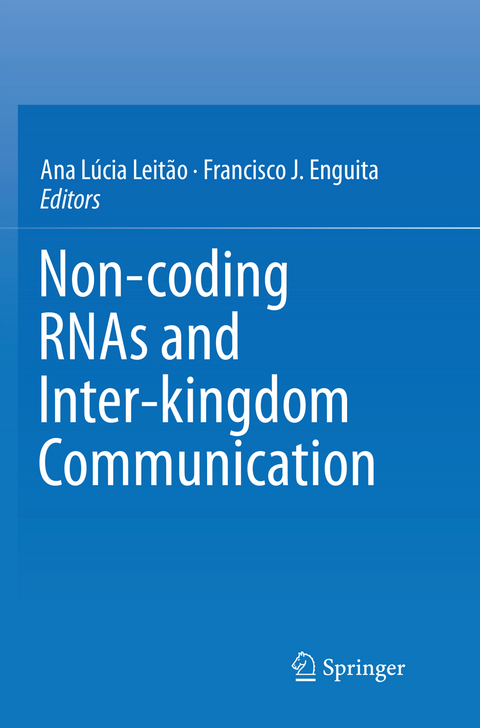
Non-coding RNAs and Inter-kingdom Communication
Springer International Publishing (Verlag)
978-3-319-81899-3 (ISBN)
Ana Lúcia Leitão, Ph.D. Ana Lúcia Leitão Ph.D., Biological Engineer, graduated in Applied Chemistry by the New University of Lisbon in 1992. She worked for the Portuguese National Institute for Industrial and Technical Engineering (INETI) in 1993 in a pos-graduation of applied molecular biology. In 1994 she obtained a post-graduation in Microbiology and Biotechnology in the framework of the Young Technician for Industry Programme. In 1995 she started her Ph.D. studies at the Department of Microbiology, Faculty of Biology in León, Spain with a fellowship of Merck Sharp and Dome (New Jersey, USA). She obtained a Ph.D. in biological engineering, from the Life Sciences Department, New University of Lisbon in 1999. Since 1999, she became professor in the Faculty of Sciences and Technology, New University of Lisbon (September 2000-present). She is author of more than 30 scientific publications in international papers and book chapters, and supervisor of 33 Master theses half of them in industry sector. Currently, her research interests are focused on the production of bioactive compounds from fungal strains isolated from non-common environments, and transcriptomic characterization of their metabolic pathways. Francisco J. Enguita, Ph.D. Francisco J. Enguita, Ph.D. is Professor of Cell and Molecular Biology at the University of Lisbon Medical School, and Principal Investigator at the Institute of Molecular Medicine from the same University. He got a degree in Pharmaceutical Sciences (1991) from the University of Granada, Spain, and a Ph.D. in Microbiology and Genetics at the School of Pharmacy from the University of Salamanca, Spain (1998). He did a post-doctoral training on Structural Biology and X-ray crystallography at the ITQB supported by an EMBO long-term fellowship (1999-2001), New University of Lisbon. During the period from 2004-2006 he was a group leader in the same institution. He joined the Institute of Molecular Medicine in 2006 as a research member of the Cell Biology Unit and later on as a principal investigator. He is author more than 50 scientific publications, and supervisor of 5 Ph.D. thesis and 6 Master thesis. His current research interests are focused on the role of non-coding RNAs in human diseases, with specific focus on infection.
Part 1. Non-coding RNAs in Bacterial and Viral Interactions with Different Hosts.- Chapter 1. The Roles of microRNAs and piRNAs in Virus-host Interactions.- Chapter 2. Microbial Manipulation Host Dark Matter.- Chapter 3. Interplays between Gut Microbiota and Gene Expression Regulation by miRNAs: Towards a Symbiotic Vision of Host and Guest.- Chapter 4. Azotobacter vinelandii Small RNAs: Their Roles in the Formation of Cysts and Other Processes.- Chapter 5. Streptomyces Bacteria: Specialized Metabolism, Inter-species Interactions and Non-coding RNAs.- Chapter 6. Role of Small RNAs in Wolbachia-mosquito Interactions.- Chapter 7. Uptake and Reaction of C. elegans to Environmental RNAs.- Part 2. Non-coding RNAs and Interactions between Eukaryotic Organisms.- Chapter 8. Rapid Evolution of Mosquito Anti-viral ncRNA Pathway Components.- Chapter 9. Differential Expression of Toxoplasma gondii microRNAs in Murine and Human Hosts.- Chapter 10. Hypothetical Plant-mammal Small RNA Communication: Packaging and Stoichiometry.- Chapter 11. Different Types of Small RNAs in Protozoa.- Chapter 12. Function of Non-coding RNA in Toxoplasma gondii Infection.- Chapter 13. MicroRNAs of Filarial Nematodes: A New Frontier in Host-pathogen Interactions.- Chapter 14. Human Fungal Infections: Emerging Role of Small Non-coding RNAs as Modulators of Host-pathogen Interactions.
| Erscheint lt. Verlag | 12.6.2018 |
|---|---|
| Zusatzinfo | VIII, 251 p. 42 illus., 33 illus. in color. |
| Verlagsort | Cham |
| Sprache | englisch |
| Maße | 155 x 235 mm |
| Gewicht | 543 g |
| Themenwelt | Naturwissenschaften ► Biologie ► Genetik / Molekularbiologie |
| Naturwissenschaften ► Biologie ► Mikrobiologie / Immunologie | |
| Naturwissenschaften ► Biologie ► Mykologie | |
| Schlagworte | Bacterial communication • cell interaction • Cell to Cell Communication • Eukaryotic cells • Host-pathogen interactions • Non-coding RNA • Non-coding transcriptome • Pivotal Molecule |
| ISBN-10 | 3-319-81899-6 / 3319818996 |
| ISBN-13 | 978-3-319-81899-3 / 9783319818993 |
| Zustand | Neuware |
| Haben Sie eine Frage zum Produkt? |
aus dem Bereich


